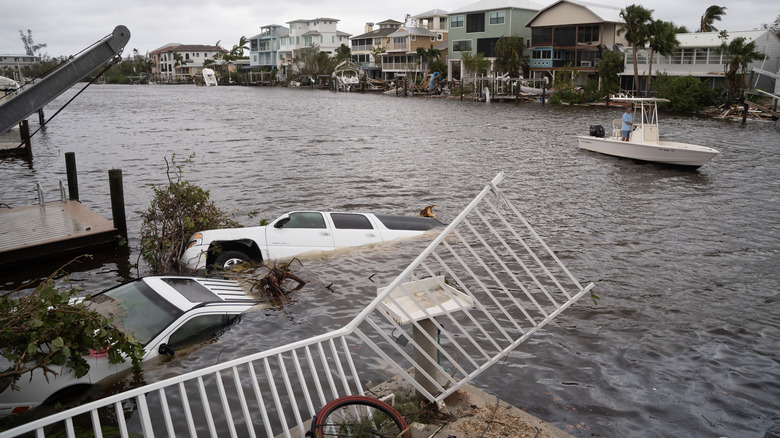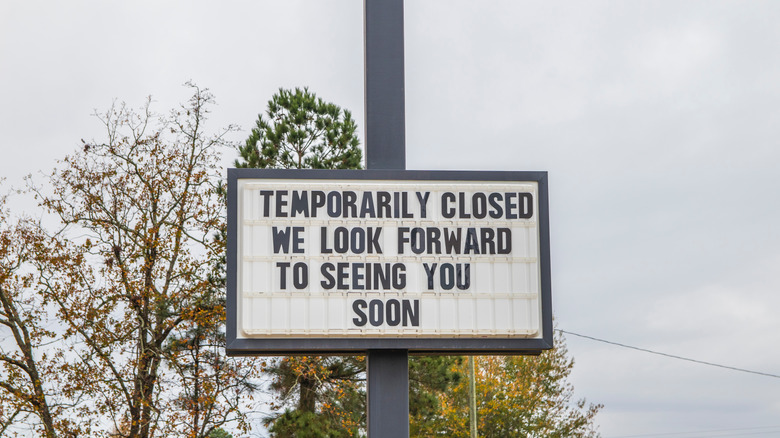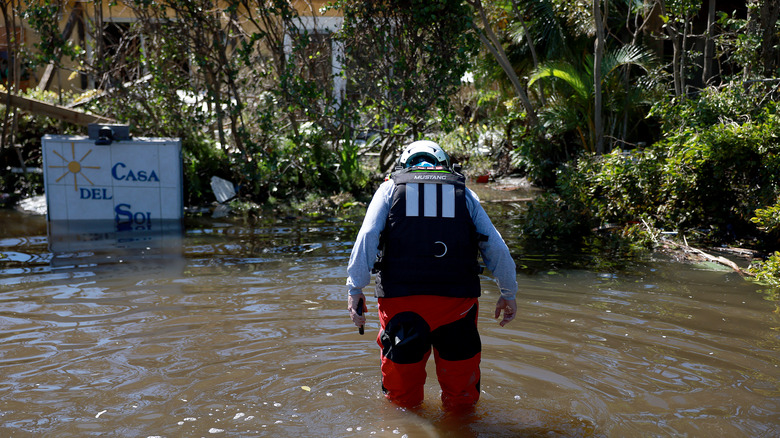How Florida's Food Industry Is Navigating Hurricane Ian's Aftermath
Hurricane Ian has left at least 21 people dead throughout Florida as of 11:26 a.m. on Friday, September 30, per ABC News. The Category 4 hurricane first touched down along Florida's west coast on Wednesday, September 28, before wreaking havoc across the state. "We've never seen a flood event like this. We've never seen storm surge of this magnitude," Florida governor Ron DeSantis told the press on Thursday (via The New York Times).
The damage is still being assessed, but as of September 30, nearly 2 million people in southwest Florida are without electricity access to their homes and businesses, according to Axios. Many structures have been decimated. Many roads are incapable of navigation. Nevertheless, DeSantis takes issue with President Joe Biden's warning that Hurricane Ian could turn out to be the deadliest hurricane in Florida, per Tampa Bay Times. Rather, he points to the 1928 storm, whose death toll reached more than 2,500. However devastating Hurricane Ian's ravages will turn out to be for Florida, DeSantis acknowledges that recovery could take years, per The New York Times.
In the meantime, Florida's food industry is facing extraordinary challenges, starting with damage to crops, according to Food Business News, which specifically mentioned sugar cane and citrus fruit crops as being of concern. Further, this all comes at a time when Florida's orange crop was already disconcertingly low. Here's how the industry is currently navigating Ian's devastating aftermath.
The Federal Waffle House Index was an early cause for concern
"You know things are bad when Waffle House doesn't open its doors," the Orlando Sentinel commented in 2021. So does the Federal Emergency Management Agency, which maintains a "Waffle House Index" to gauge the devastation wrought by natural disasters such as hurricanes, per USA Today. Not that there's a question Hurricane Ian has left decimation in its wake after ripping through a cross-section of Florida earlier this week before making its way to points north. But to offer an idea of how bad things actually are for Florida's restaurant industry, Waffle House has reportedly closed at least 35 locations, per USA Today. When they can reopen remains unknown as the Hurricane's fallout continues to be assessed.
At a time in our nation's history when food insecurity has taken center stage and food inflation is through the roof, with no signs of correction to come any time soon, it's not just the restaurant industry that is feeling the pain, however. Other major players in the food industry are also struggling to navigate the literal and figurative floodwaters. For example, Florida is home to one of the nation's largest suppliers of fertilizer, and according to Fox Business, it's been shut down temporarily in the aftermath of Hurricane Ian. Reverberations may be felt not only in Florida but all throughout the nation, with industry experts predicting a possible further spike in grocery prices, also per Fox Business.
The Hurricane's aftermath presents various snags for food suppliers
Hurricane Ian has finished wreaking havoc on Florida and moved on to points north, but more pain is to come as many food suppliers find themselves without power and without a means to communicate thanks to outages at cell phone towers, according to Food Business News (FBN). Even those who have been able to remain operative may already be facing impassable roads as they attempt to deliver food products to their restaurant and retail customers.
"If a driver encounters even a foot and a half of water on a roadway, it could interfere with the company's ability to fulfill deliveries," Paul Baltzer, VP of communications at Flowers Foods, Inc., told FBN. One way Flower Foods is navigating this challenge is by working with "sister bakers in New Orleans and Atlanta," who may be better equipped to offer logistics support. Other food supply issues that may arise due to Hurricane Ian include delays in planting crops such as sugar cane due to heavy rainfall.
All of this, of course, puts a damper on the current U.S. plans to tackle ongoing food inflation and supply chain woes. However, hope remains, and the food industry trudges on. To wit, Orlando's Toufayan Bakeries and Lakeland's Campbell Snacks are both open again after temporary closures. And Progressive Grocer reports that Publix pledged $1 million to assist rescue organizations such as American Red Cross and United Way.


